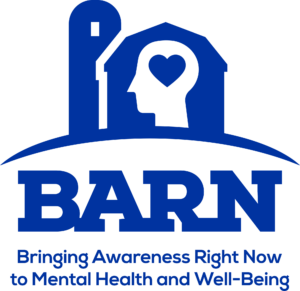Trainings for Recognizing, Addressing, and Reducing Farm Stress
 In the effort to address stressors and reduce stress among farmers, ranchers, and agricultural workers, trainings are an important piece of the puzzle— from making use of existing trainings by service providers who work with farmers to creating trainings to be used directly with farm families.
In the effort to address stressors and reduce stress among farmers, ranchers, and agricultural workers, trainings are an important piece of the puzzle— from making use of existing trainings by service providers who work with farmers to creating trainings to be used directly with farm families.
When it comes to farm stress, resources and trainings go hand in hand. Whereas the resources offer a tangible means of relieving a stressor in the form of loans, legal assistance, or equipment repair, trainings focus on awareness of and coping with stress.
Many of our partners across the region use QPR (Question, Persuade, Refer) and MHFA (Mental Health First Aid) training with various audiences who interact with the agricultural community—and they also offer “train the trainer” trainings to extend the impact of these vital programs. Other partners have developed direct programs that are meant to be used directly with the farming population.
Trainings for Service Providers
SAgE partner Dr. Chaney Mosley, assistant professor of Agricultural Engineering at Middle Tennessee State University, has used QPR training to address farm stress in professional development sessions for school-based agricultural educators. “QPR is a valuable tool for school-based agricultural educators because it equips them with the skills to recognize signs of distress in their students and students’ families, initiate supportive conversations, and connect those in need with appropriate resources, thereby fostering a supportive and responsive educational environment,” he says.
Dr. Brittney Schrick, Associate Professor-Family Life Specialist at the University of Arkansas Division of Agriculture Cooperative Extension Service, uses MHFA to equip rural communities across Arkansas. Working with statewide agencies like Blue Cross/Blue Shield, Arkansas Rural Health Partnership, Dr. Schrick and her team have provided statewide MHFA training. They’ve also provided trainings in the Baptist Healthcare System to their chaplains and community health nurses who work in schools and rural health clinics.
The Arkansas Extension Homemakers Council, made up of about 3500 women from rural communities across the state, has adopted mental health as their service project for the last two years, and Dr. Schrick’s group has provided several free MHFA trainings for their membership. “What we’ve learned in trying to implement our project with SAgE is that direct service to farmers and ranchers is difficult,” she says. “So we’re attempting to surround farmers, ranchers, and agricultural workers within their communities with support. If we can reach people in rural communities, by extension we’ll be supporting producers.”
Direct Programs
SAgE partners at the University of Kentucky developed BARN (Bring Awareness Right Now) and Farm Dinner Theater and supplemental program guides to bring programming directly to the agricultural community and their families to raise the level of awareness about stress and the negative mental health outcomes it can lead to. The program has QPR training built into it, so participants leave with the tools not only to recognize their own responses to stress but also to look for signs that their neighbors may be having difficulty. Because this is geared to farm families, the resources provided include a youth stress guide as well as tips for talking to younger children.
supplemental program guides to bring programming directly to the agricultural community and their families to raise the level of awareness about stress and the negative mental health outcomes it can lead to. The program has QPR training built into it, so participants leave with the tools not only to recognize their own responses to stress but also to look for signs that their neighbors may be having difficulty. Because this is geared to farm families, the resources provided include a youth stress guide as well as tips for talking to younger children.
Partners at Mississippi State University produced a series of films called On the Farm that show real farmers dealing with real stressors. Screenings of the films with accompanying discussion guides provide an opportunity for participants to relate to or empathize with the situations depicted in the film. This can help farmers, ranchers, and agricultural workers feel supported as their struggles are named and made visible, and it gives non-farming community members an awareness of how they can be supportive.
You can information about these training programs and download the accompanying materials on our Trainings page.
